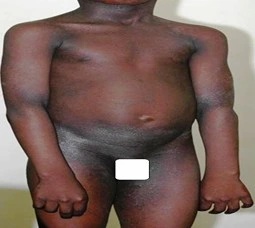Author's details
- Hakim A Abubakre
- BA (Hons) International Business Management, Msc Digital Marketing.
Reviewer's details
- Dr. Khashau Eleburuike
- MBBS (Ilorin) MSc. Global Health Karolinska Institute.
- Resident doctor in family medicine in Northen Sweden.

- Date Published: 2026-01-03
- Date Updated: 2025-03-19
Eczema in sub-Saharan Africa
Key Messages
- Eczema causes dry, itchy, and inflamed skin patches, especially in children.
- Genetics and environmental triggers like climate and irritants contribute to eczema.
- Regular moisturizing and avoiding triggers are essential for managing symptoms.
- Seek medical attention if eczema becomes infected, painful, or disrupts sleep.
- While there is no cure, proper care can control eczema and improve quality of life.
Eczema, also known as atopic dermatitis, is a common skin condition that causes dry, itchy, and inflamed patches on the skin. This can affect both adults and children, with children from Africa often showing different eczema patterns compared to children of other ethnicities. It is not contagious but can cause significant discomfort, particularly due to the intense itching that can affect sleep, especially in children.
Children with eczema may experience dry, red, sore, and itchy patches on their skin. The itch can be unbearable, often leading to constant scratching, which can further irritate the skin, especially at night. In moderate to severe cases, children may scratch until their skin bleeds, and the dry areas may crack, exposing the skin to infections. African children just other children in the world often develop eczema in the creases of the knees and elbows, with fine bumps sometimes appearing on the chest and tummy.
- Itchy, dry, scaly skin
- Redness and swelling
- Small bumps that break and bleed when scratched
- Blisters, oozing, and crusting (indicating infection)
- Rash that varies in color based on skin tone
- Thickened skin in affected areas
- Darkening of skin around the eyes
Eczema may result from a combination of genetic factors and environmental triggers. Some causes include:
- Genetics: Family history of eczema, asthma, hay fever, or allergies can increase the risk.
- Skin Barrier Defects: A gene variation can weaken the skin’s ability to retain moisture and block harmful substances.
- Environmental Irritants: Exposure to smoke, air pollution, harsh soaps, certain fabrics (like wool), and allergens like pet dander or pollen.
- Climate: Hot and humid conditions can worsen symptoms, likewise during harmattan or dry season, there may be more of the symptoms.
- Emotional Stress: Anxiety, stress, or depression can trigger eczema flare-ups.
Managing eczema involves a combination of proper skincare and avoiding triggers.
- Avoid frequent baths or showers, limit bathing to once a day or better still 3 times a week but use moisturizers even if you do not bath.
- Moisturize 2-3 times daily using unscented creams or natural oils like shea butter.
- Apply moisturizer immediately after bathing while the skin is still damp.
- Avoid hot and cold extremes in temperature.
- Use mild, fragrance-free soap and wear loose-fitting clothing made from soft materials like cotton.
- Keep nails short to prevent damage from scratching.
- Rub in moisturizers when the skin itches
- Use cool compresses or ice to soothe inflamed skin.
- Engage in stress-relief activities and maintain good sleep hygiene.
Consult a doctor if:
- Your eczema is infected, with blisters, crusting, or oozing fluid.
- The affected areas are painful, swollen, or warm to the touch.
- There is a sudden worsening or spreading of eczema.
- You experience fever or generally feel unwell.
- Eczema significantly disrupts sleep.
Though eczema cannot be entirely prevented, these tips can help reduce flare-ups:
- Moisturize skin at least twice a day, especially after washing.
- Avoid harsh soaps, detergents, and irritants.
- Wear loose-fitting clothes made from natural fabrics like cotton.
- Keep showers brief (under 15 minutes) and use lukewarm water.
- Use a humidifier to maintain air moisture.
- Manage stress and avoid allergens and known triggers.
Eczema is a common skin condition characterized by dry, itchy, and inflamed patches that can significantly impact daily life, especially in children. While genetics play a role, environmental factors such as heat, humidity, irritants, and stress can exacerbate symptoms. Effective management includes regular moisturizing, avoiding triggers, and seeking medical attention when necessary. Although there is no cure, proper care and lifestyle adjustments can help control symptoms and improve quality of life.
- Manjra AI, Du Plessis P, Weiss R, Motala CM, Potter PC, Raboobee N, Ndlova N, Weinberg EG. Childhood atopic eczema consensus document. South African Medical Journal. 2005;95(6).
- Langan SM, Silcocks P, Williams HC. What causes flares of eczema in children?. British Journal of Dermatology. 2009 Sep 1;161(3):640-6.
- Ersser SJ, Cowdell F, Latter S, Gardiner E, Flohr C, Thompson AR, Jackson K, Farasat H, Ware F, Drury A. Psychological and educational interventions for atopic eczema in children. Cochrane Database of Systematic Reviews. 2014(1).
- Mercer MJ, Joubert G, Ehrlich RI, Nelson H, Poyser MA, Puterman A, Weinberg EG. Socioeconomic status and prevalence of allergic rhinitis and atopic eczema symptoms in young adolescents. Pediatric allergy and immunology. 2004 Jun;15(3):234-41.
- Lewis-Jones S, Mugglestone MA. Management of atopic eczema in children aged up to 12 years: summary of NICE guidance. Bmj. 2007 Dec 13;335(7632):1263-4.
